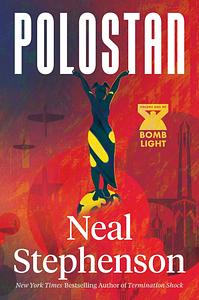Take a photo of a barcode or cover
adventurous
informative
mysterious
reflective
slow-paced
Plot or Character Driven:
A mix
Strong character development:
Complicated
Loveable characters:
No
Diverse cast of characters:
Yes
Flaws of characters a main focus:
Yes
Polostan is a fascinating yet frustrating novel. As someone who loves Stephenson’s dense, slow-burn style (Anathem is one of my all-time favorites), I found myself both impressed by and let down by this book.
The first 250 pages feel like an extended prologue, building the backstory of Dawn/Aurora as she moves through San Francisco, Magnitogorsk, and Washington D.C. The atmosphere is immersive, and the historical setting is rich with detail. The bleakness of Soviet Russia is well-rendered, and the political paranoia feels tangible and grounded. But the pacing drags, and the narrative momentum never quite reaches the payoff you'd expect from such a lengthy setup.
Stephenson is once again liberal with real-world history, inserting historical figures like Major Patton and Richard Feynman into the narrative, a technique reminiscent of Cryptonomicon. Sometimes it’s an intriguing alt-history device; sometimes it may stretch believability. The scene where Patton invites a teenaged girl he just met to discuss military secrets was particularly hard to swallow, breaking immersion rather than deepening it.
Dawn herself is initially a passive character, someone things happen to, rather than someone who acts. By the time her agency emerges, the novel abruptly ends, making the whole thing feel like Volume 1 of a much larger story. Whether due to editorial decisions or intent to serialize, the book feels unfinished. If this is the first of a trilogy, it’s intriguing. If it’s a standalone, it’s deeply unsatisfying.
Still, the book is not without its pleasures: the Cold War-era worldbuilding, the shadowy OGPU, the camps around D.C., the interplay of identity, ideology, and betrayal. But it reads more like a sketch for a larger canvas Stephenson hasn’t yet painted.
The first 250 pages feel like an extended prologue, building the backstory of Dawn/Aurora as she moves through San Francisco, Magnitogorsk, and Washington D.C. The atmosphere is immersive, and the historical setting is rich with detail. The bleakness of Soviet Russia is well-rendered, and the political paranoia feels tangible and grounded. But the pacing drags, and the narrative momentum never quite reaches the payoff you'd expect from such a lengthy setup.
Stephenson is once again liberal with real-world history, inserting historical figures like Major Patton and Richard Feynman into the narrative, a technique reminiscent of Cryptonomicon. Sometimes it’s an intriguing alt-history device; sometimes it may stretch believability. The scene where Patton invites a teenaged girl he just met to discuss military secrets was particularly hard to swallow, breaking immersion rather than deepening it.
Dawn herself is initially a passive character, someone things happen to, rather than someone who acts. By the time her agency emerges, the novel abruptly ends, making the whole thing feel like Volume 1 of a much larger story. Whether due to editorial decisions or intent to serialize, the book feels unfinished. If this is the first of a trilogy, it’s intriguing. If it’s a standalone, it’s deeply unsatisfying.
Still, the book is not without its pleasures: the Cold War-era worldbuilding, the shadowy OGPU, the camps around D.C., the interplay of identity, ideology, and betrayal. But it reads more like a sketch for a larger canvas Stephenson hasn’t yet painted.
I love good historical fiction and I love Neal Stephenson, and this book is both, so there you go. It's very much the beginning of a series; it's paced like a much longer work and doesn't begin to scratch the surface of the epic-scale story that it hints at, with cameo appearances by the likes of General Patton and Richard Feynman. (Feynman is not explicitly named; he appears here as a hyperactive, brilliant physics student called Dick from Far Rockaway -- I recognized him, of course, but this treatment of his identity as easter egg for those in the know makes me wonder who else appeared in these pages whom I didn't cotton on to.) This volume is an origin story, ending with its protagonist Dawn a/k/a Aurora at only 19 or so, at odds with both the FBI and the OGPU, so it's clear that she has a big future ahead of her once the Cold War heats up. I'm looking forward to the rest of the story.
adventurous
dark
informative
mysterious
tense
slow-paced
mysterious
medium-paced
adventurous
challenging
dark
mysterious
tense
medium-paced
Plot or Character Driven:
Plot
Strong character development:
Complicated
Loveable characters:
No
Diverse cast of characters:
Yes
Flaws of characters a main focus:
Complicated
emotional
informative
inspiring
mysterious
reflective
tense
medium-paced
Plot or Character Driven:
A mix
Strong character development:
Yes
Loveable characters:
Yes
Diverse cast of characters:
Yes
Flaws of characters a main focus:
Complicated
odd introduction to stephenson. i'll tune in for the next volume
adventurous
informative
medium-paced
Plot or Character Driven:
A mix
Strong character development:
Yes
Loveable characters:
Complicated
Diverse cast of characters:
Yes
Flaws of characters a main focus:
Yes
adventurous
dark
funny
informative
medium-paced
Plot or Character Driven:
Character
Strong character development:
Yes
Loveable characters:
Yes
Diverse cast of characters:
No
adventurous
relaxing
medium-paced
Plot or Character Driven:
A mix
Strong character development:
No
Loveable characters:
No
Diverse cast of characters:
No
Flaws of characters a main focus:
Yes
Breezy, but seems like an extended prologue for book 2.
Moderate: Miscarriage
adventurous
funny
hopeful
mysterious
fast-paced
Plot or Character Driven:
Character
Strong character development:
Yes
Loveable characters:
Yes
Diverse cast of characters:
Complicated
Flaws of characters a main focus:
Yes







